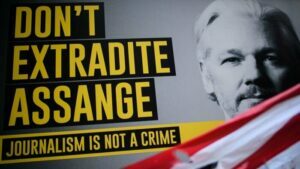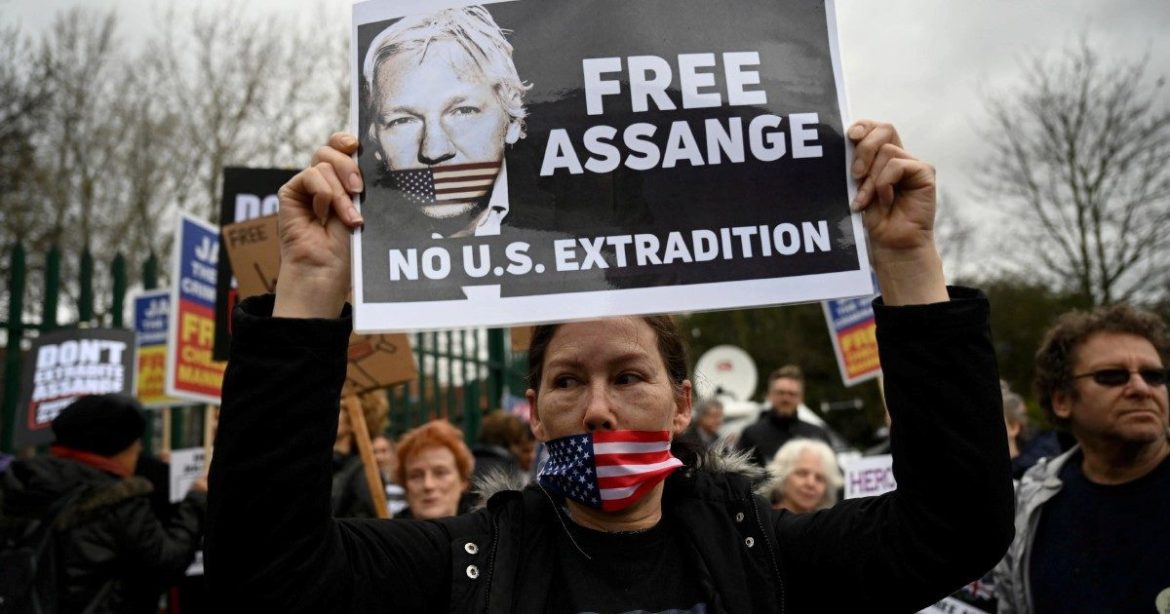WIKILEAKS - After years of running up against a brick wall, the first crack has appeared with the latest ruling on our FOIA [UK Freedom of Information Act] case issued by Judge O’Connor. In addition to the ruling, British Labour MP John McDonnell has just obtained new information from the Crown Prosecution Service. McDonnell is calling for an independent inquiry into the CPS’s role in the Assange case.
Judge orders the Crown Prosecution Service to come clean about the destruction of key documents on Julian Assange
The following artcle is translated from Italian by Google translate.
DI STEFANIA MAURIZI 31 May 2023
READ THE RULING ISSUED BY JUDGE O’CONNOR
Judge O’Connor has also confirmed that “WikiLeaks is a media organization”, though he rejected all of our requests to access the full correspondence…
The Crown Prosecution Service must comply with this judicial order by June 23, and any failure on their part to do so could lead to contempt proceedings.
Ever since 2017, when we first discovered that documents had been destroyed, we have consistently run up against a brick wall: the Crown Prosecution Service (CPS) has always maintained that deletion of those documents was in conformity with their standard operating procedure. A previous ruling issued in 2017 by the London First-tier Tribunal – chaired by a different judge, Andrew Bartlett – averred that there was “nothing untoward” about their deletion, and the British body instituted to uphold information rights, the Information Commissioner (ICO), has always been pleased with the decision that there was “nothing untoward” about it.
This new ruling by judge O’Connor is the first crack in the brick wall.
Judge O’Connor has also confirmed that “WikiLeaks is a media organization”, though he rejected all of our requests to access the full correspondence between the Crown Prosecution Service and the U.S. State Department, the U.S. Department of Justice, the Swedish Prosecution Authority and the Ecuadorian authorities on the Julian Assange case from 2010 to 2019.
Relative to the correspondence between the CPS and Ecuador, the judge ruled in favour of the Crown Prosecution Service, maintaining an exemption to “neither confirm nor deny” that the British and the Ecuadorian authorities exchanged emails on the case.
As for the case of all other correspondence between the CPS and the Swedish authorities, between the CPS and the U.S. Department of Justice, and between the CPS and the U.S. State Department, Judge O’Connor ruled that if released, the documentation would risk damaging the relationship of trust and confidence that underlies information sharing between prosecuting authorities, and that it would be likely to have a chilling effect on the relationship with both the Swedish and US authorities, as well as with other foreign authorities.
The ruling was issued in two forms: a decision available to the public, and a separate closed decision which can be accessed only by the UK authorities at the Crown Prosecution Service and by ICO.
The documentation on which the closed ruling is based includes, among other documents, over 552 pages of correspondence between the CPS and the U.S. Department of Justice and between the CPS and the State Department between 2010 and 2019, including “the provision of legal advice and queries on wider strategic matters relating to Mr. Assange’s extradition to that country”.
This correspondence is part of the documentation which we have been requesting under FOIA for years, and which has always been denied to us. And yet accessing it would be crucial, as the British authorities are assisting the U.S. government in extraditing a journalist for revealing war crimes and torture, as if he was a mafia boss or drug dealer. From Amnesty International to the International Federation of Journalists (IFJ), all major organizations for the defense of human rights and freedom of the press have called for the extradition case to be dropped and Assange freed.
Assange remains in prison, however, waiting for British justice to decide on his appeal against extradition to the United States, where he risks 175 years in prison for obtaining and publishing classified U.S. government files.
All requests to drop the charges and free Julian Assange have been ignored by the British and U.S. governments. And all decisions and opinions of highly respected UN bodies like the UN Working Group on Arbitrary Detention (UNWGAD) or the UN Special Rapporteur on Torture from 2016 to 2022, Nils Melzer, have been completely ignored by the British government, if not ridiculed, as occurred with the UNWGAD decision.
Now that Judge O’Connor has rejected our request to access those documents, in particular the correspondence between the U.S. and the U.K., the oversight role that the Fourth Estate should play also risks being severely undermined. And yet we are not alone in our call for public scrutiny.
In addition to the authoritative report by Nils Melzer and our FOIA battle, recently a British Labour member of Parliament, John McDonnell, has also submitted a FOIA request to the CPS, full of detailed questions which were just answered by the Crown Prosecution Service.
Speaking to Il Fatto Quotidiano, John McDonnell told us: “It’s become clear that there must now be an independent inquiry into the role of the CPS in relation to the case of Julian Assange. We need full openness and transparency”.
The role of the Crown Prosecution Service in the Assange case
The Crown Prosecution Service has been a key player in the case from the very beginning; since 2010, the year in which Assange and WikiLeaks published the classified U.S. documents for which he risks life in prison, and the very same year he ended up under investigation in Sweden for alleged rape.
Since 2015, the author of this article has been engaged in trench warfare to unearth the facts about Julian Assange and the WikiLeaks journalists through FOIA cases in the United Kingdom, Sweden, United States and Australia. We have experienced tremendous pushback, and the process has been fabulously expensive. Four governments have been denying us access to the documentation.
Nonetheless, our FOIA work has permitted unearthing some crucial information, such as the fact that it was the Crown Prosecution Service that advised the prosecutors with the Swedish Prosecution Authority (SPA) against the only investigative strategy which could have led to a quick resolution of the Swedish case: questioning Assange in London, rather than insisting on questioning him only after extraditing him to Sweden.
This legal advice was delivered by Paul Close, a lawyer with the CPS’s Special Crime Division—the division responsible for prosecuting high-profile cases— and helped create the legal and diplomatic quagmire which kept Assange arbitrarily detained in London from 2010, initially under house arrest for 18 months and then confined in the Ecuadorian embassy for 7 years.
In 2013, even the Swedish authorities began to question the dead end into which they had waded at the advice of the British authorities by insisting on extradition. They considered dropping the extradition case, writing to the Crown Prosecution Service: “Hope I didn’t ruin your weekend”.
Why would a Swedish prosecutor dropping an extradition attempt for a sex case in Sweden ruin the weekend of CPS authorities?
There are too many unanswered questions in this case. Some of the key decisions were taken when the Crown Prosecution Service was headed by Keir Starmer, current leader of the British Labour Party. What role, if any, did Keir Starmer play in the Julian Assange case?
The highly anomalous handling of the Swedish case by both the Swedish prosecutors and the Crown Prosecution Service resulted in justice for no one, contributed to the devastation of Assange’s health, cost British taxpayers at least 13.2 million pounds to keep the Ecuadorian embassy under siege, resulted in the UN Working Group on Arbitrary Detention decision that Sweden and Britain had arbitrarily detained Assange since 2010 and, finally, led the UN Special Rapporteur on torture, Nils Melzer, to denounce 50 perceived due process violations.
The Swedish case is now closed, yet not only do these questions and the alleged violations flagged by Nils Melzer remain unaddressed, but the Crown Prosecution Service is still playing a prominent role in the Assange case, as the United States is acting through the CPS to try to extradite Assange to the United States.
That is why it is crucial to dig into the actions of the CPS, to access its full correspondence with the American, Swedish and Ecuadorian authorities and, in particular, to access the correspondence of Paul Close.
All authorities have refused to clarify how many pages they hold on Assange, but the Crown Prosecution Service did provide us with an estimate of their correspondence with SPA: from 2010 to 2015, they reportedly exchanged between 7,200 and 9,600 pages.
Over the last 8 years of our FOIA battle, we have obtained just 551 pages from the Crown Prosecution Service and 1373 pages from the Swedish Prosecution Authority (SPA). Of these 1373 pages of documents from the SPA, only 310 pages represent correspondence between the SPA and CPS.
When we tried to access the full correspondence of Paul Close, the Crown Prosecution Service replied that his account had been deleted after he retired in 2014, and that “all the data associated with Paul Close’s account was deleted when he retired and cannot be recovered”.
Sweden also destroyed a substantial part of the documentation on the case, including an email from the FBI dated March 2017, when the CIA was formulating plans to kill or kidnap Julian Assange.
We discovered this fact only last February, and only because the Crown Prosecution Service disclosed this information about their Swedish colleagues to us after we had tried to obtain those documents from Sweden for years, to no avail.
Subscribe and donate to Rise Up Times
Media for Justice and Peace
Support independent media
Paypal/Card
To mail a check
To this day, the Swedish authorities have not provided us with any explanation as to why key documents were destroyed, nor when and how, and on whose instructions. All of our attempts to shed light on the matter through litigation have failed.
Why were key documents destroyed by the CPS?
The Crown Prosecution Service has always maintained that there was nothing unusual about the deletion of Paul Close’s account: it was deleted three months after he retired in 2014. At that point, Keir Starmer was no longer Director of Prosecution at CPS.
It has also always maintained that the deletion of the account was consistent with their record management policies. But the CPS’s Records Management Manual states that general correspondence relating to a criminal case file should be retained for “5 years from the date of most recent correspondence.” But they deleted it anyway.
After reiterating to us for years that Paul Close’s emails were destroyed 3 months after he retired, last January the CPS changed their version of the facts, stating that “there is a document which is described as desk instructions in relation to the deletion of material within 30 days”.
So was Paul Close’s account deleted after three months, or after 30 days? And why was it deleted? Is the Crown Prosecution Service confident that all the relevant emails and documents were transferred from the email account and copied to the case file before deletion?
A Parliamentary Inquiry?
In recent months, British Labour MP John McDonnell filed a FOIA request with the CPS to learn whether then-Director of Prosecution Keir Starmer was informed about the advice Paul Close gave the Swedish prosecutors not to question Assange in London, and about the fact that the Swedes considered dropping the extradition case in 2013.
He also asked which documents CPS destroyed, why, how, and on whose instructions, and if the CPS could provide him with a list of legal cases in which the Crown Prosecution Service deleted key documents in the last decade. Finally, McDonnell asked whether Paul Close’s email account could be retrieved from any backup tapes or other backup methods.
With regard to Keir Starmer, the Crown Prosecution Service replied to the British parliamentarian that a search of the documentation has revealed no indication that the CPS hold information on whether Starmer was informed about those key decisions relative to Assange. However, the CPS clarified: “We hold 59 boxes of information pertaining to the case of Mr Assange. The team concluded that it would not be proportionate to review all of these in depth in keeping with the provisions of the FOI [Freedom of Information] Act”.
As with the destruction of Paul Close’s email account, the CPS argued that it “cannot ‘know’ that all relevant emails were transferred to the case file” before the account was deleted, though that was the “standard practise”. Finally, the public authority replied that “CPS does not hold any back-ups of deleted email account” and that, in the last decade, they could only identify a single case of premature destruction of case material related to a case other than that of Julian Assange. While the Crown Prosecution does not characterize the case of the deletion of Paul Close’s account as “data breach”, in the other case it does.
Such bad luck for Julian Assange. He was held in limbo for almost a decade in part thanks to the legal advice the Crown Prosecution Service gave to the Swedish prosecutors. Key correspondence on his case was destroyed perhaps three months or perhaps 30 days after the lawyer who had worked on his case from the very start retired. There is no way to know what was destroyed and what was kept. There are no back-ups. In ten years, there was only one case of premature destruction of documents.
Assange’s back luck was such that not only did the Crown Prosecution Service destroy documentation on his case, but the Swedish prosecutors did so as well. As for the rest of the correspondence between the CPS and the U.S. authorities, obtaining it by going through the law would seem to be mission impossible.
John McDonnell believes that “there must now be an independent inquiry into the role of the CPS in relation to the case of Julian Assange”. It could be the last and only chance. Will it happen?
Independent media is essential in these Rise Up Times. Your support makes Rise Up Times, Media for Justice and Peace possible. Please donate today.
Subscribe to Rise Up Times today. Donations of every amount are welcome.





